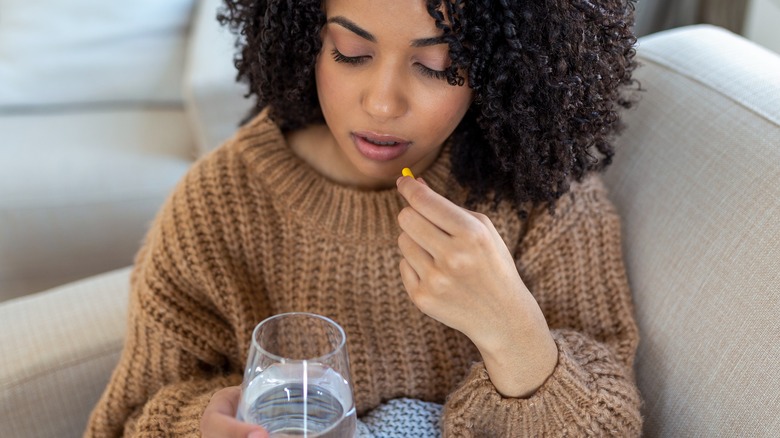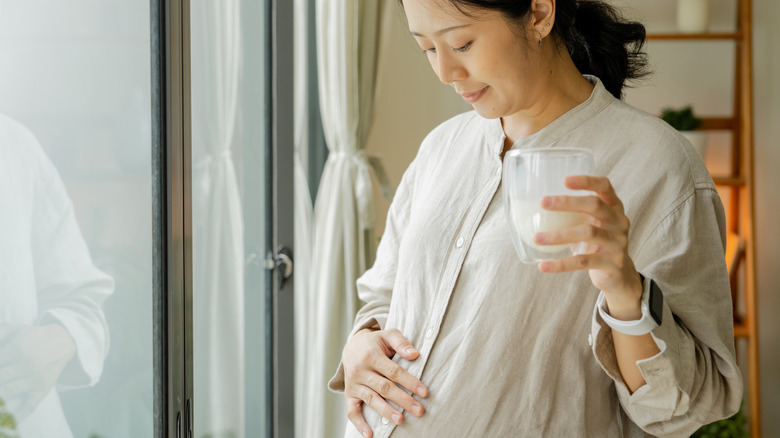The Common Medication That Makes Energy Drinks Last Longer
You may not think much about buying a Red Bull or Monster Energy on your way to work or when you have a long night planned out ahead of you. Sometimes you just need that extra boost. But did you know that there are certain things that affect how long the effects of energy drinks stay in your system?
As it turns out, there's a common medication that inhibits the metabolization of energy drinks: birth control pills. It has to do with what's really in energy drinks. When you sip on (and finish) a can of Red Bull, it takes about 10 minutes for the caffeine in the beverage to reach your bloodstream, per Medical News Today. Between 15 and 45 minutes, you start to feel alert and more focused, but it doesn't take long after that for the effects of the sugar and caffeine to come down. You will start to feel tired at the one-hour mark. At about 5 to 6 hours since you consumed the energy drink, you reach what is known as the "half-life" of caffeine — a 50% reduction of the caffeine in your system.
When you're on oral contraceptives, this time period doubles, meaning it will take about 12 hours for the caffeine level to reach "half life." For someone who isn't on birth control medication, at the 12-hour mark, the caffeine would have fully left their system, so you can imagine how long it's going to take for someone who's on the pill.
Why do birth control pills cause caffeine sensitivity?
It has to do with the enzyme in your body responsible for breaking down caffeine, per a 2001 study published in the National Academies Press — more specifically, the cytochrome P450 1A2.
"Researchers suggest that hormonal birth control may inhibit the enzyme which breaks down caffeine, so that caffeine tends to stay in the system of women using birth control longer than it would in other women. So, the same amount of caffeine could hit you twice as hard if you're on birth control," explained nutritionist Emma Thornton (via A.Vogel). Something else that was observed in the study was how this common medication reduced the diuretic effect of caffeine in the women who were on it, according to Thornton. Women on the pill who've consumed energy drinks might also be more sensitive to the side effects from the caffeine boost, and this could manifest in jitteriness, increased heartbeat, and headache, per WebMD.
With that said, birth control pills aren't the only things that affect caffeine sensitivity in women.
Pregnancy makes energy drinks last longer too
The conversation surrounding whether you can drink energy drinks while pregnant is an important one. It is not encouraged by health professionals for a number of reasons.
While there is common concern about the sugar content and other ingredients in the beverage, which can be harmful to your baby (and you), it is also because pregnant women metabolize caffeine a lot slower than others (via UNM Health), much like how those on birth control medication do.
The recommended limit for caffeine intake when you're pregnant is less than 200 milligrams per day, according to the The American College of Obstetricians and Gynecologists (ACOG). That's about two six-ounce cups of coffee a day. It can be hard to completely stop coffee or energy drink consumption when you're pregnant, so Dr. David B. Nelson, an associate professor of Obstetrics and Gynecology and Division Chief of Maternal-Fetal Medicine, recommends (via UT Southwestern Medical Center) gradually cutting back when you know you're carrying a baby. "Gradual reduction in caffeine intake over several weeks before planning pregnancy, or when you find out you are pregnant, can help prevent caffeine withdrawal."
As for when you're on birth control pills, there isn't a lot of literature on the safety of consuming energy drinks. The side effects don't sound pleasant, so you may want to tread with caution.



